牛津英语上海版4A知识点梳理
上海牛津英语四年级上4A知识点梳理和配套练习(附答案))

上海⽜津英语四年级上4A知识点梳理和配套练习(附答案))4AModule 1 Getting to know youUnit 1 Meeting new people⼀.知识疏理1)词汇eleven twelve thirteen fourteen fifteen sixteen classmate2)短语Peter’s classmate go to the park a photo of talk about him ride a bicyclea new classmate student number near our school walk to school every daylike reading play basketball well sit at the table a funny mask put on the mask 3)句型This is my…. His /Her name’s…He’s/She’s…(age)He/She can…⼆.语⾔导读1)知识背景本单元主要是围绕Meeting new people这个主题展开学习的,通过对朋友或同学的介绍及描述,学习巩固物主代词his/her以及情态动词can, 熟练运⽤This is… His/Her name is…He /she can…这些句型,⿎励学⽣学会介绍他⼈。
由于之前学⽣已学过介绍⾃⼰,这⾥的重点是学习巩固物主代词his/her以及情态动词can。
2)重难点句⼦解释a) ⼝语应答A: See you. B: See you./ Goodbye./ Bye.A: Nice to meet you. B: Nice to meet you too.b) 句⼦结构分析(1) He/She can…是⼀句can句型的肯定陈述句:主语+ can +动词原形(主语变但是can⼀直不变);can句型的否定陈述句:主语+ can’t+动词原形.(2)She likes reading.是⼀句第三⼈称单数like 句型。
上海牛津英语4A单元知识整理M1M2
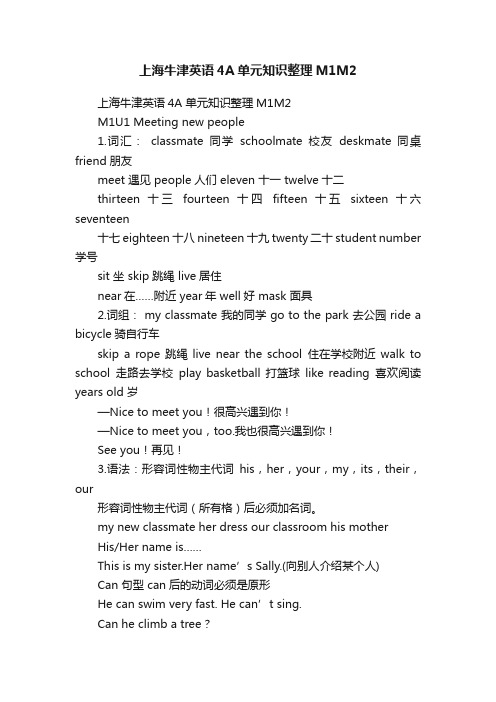
上海牛津英语4A单元知识整理M1M2上海牛津英语4A 单元知识整理M1M2M1U1 Meeting new people1.词汇:classmate 同学schoolmate 校友deskmate 同桌friend朋友meet 遇见 people人们 eleven 十一 twelve十二thirteen 十三fourteen 十四fifteen 十五sixteen 十六seventeen十七 eighteen 十八 nineteen 十九 twenty二十 student number 学号sit 坐 skip跳绳 live居住near在……附近 year年 well好 mask 面具2.词组: my classmate 我的同学 go to the park 去公园 ride a bicycle骑自行车skip a rope 跳绳live near the school住在学校附近walk to school走路去学校play basketball 打篮球like reading喜欢阅读years old 岁—Nice to meet you!很高兴遇到你!—Nice to meet you,too.我也很高兴遇到你!See you!再见!3.语法:形容词性物主代词his,her,your,my,its,their,our形容词性物主代词(所有格)后必须加名词。
my new classmate her dress our classroom his motherHis/Her name is……This is my sister.Her name’s Sally.(向别人介绍某个人)Can 句型 can后的动词必须是原形He can swim very fast. He can’t sing.Can he climb a tree?主语是第一人称I、we,第二人称you和第三人称复数they、his parents等的时候,句中动词用原形;主语是第三人称单数时,动词要相应变化(加s)She lives near our school. She walks to school every day.My friend has a nice dress。
上海牛津小学英语4A
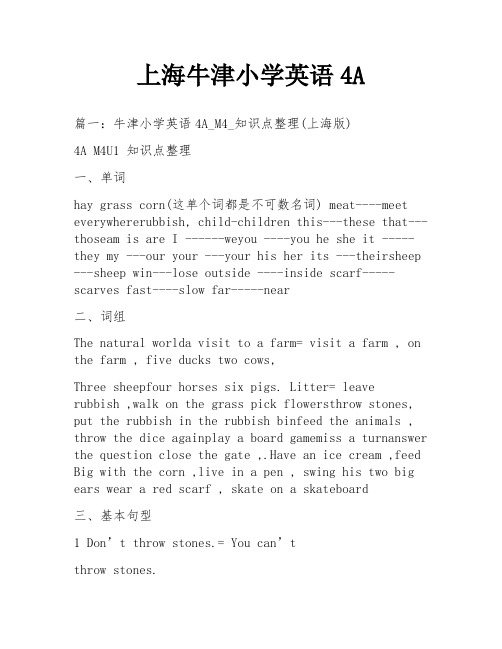
上海牛津小学英语4A篇一:牛津小学英语4A_M4_知识点整理(上海版)4A M4U1 知识点整理一、单词hay grass corn(这单个词都是不可数名词) meat----meet everywhererubbish, child-children this---these that---thoseam is are I ------weyou ----you he she it -----they my ---our your ---your his her its ---theirsheep ---sheep win---lose outside ----inside scarf-----scarves fast----slow far-----near二、词组The natural worlda visit to a farm= visit a farm , on the farm , five ducks two cows,Three sheepfour horses six pigs. Litter= leaverubbish ,walk on the grass pick flowersthrow stones, put the rubbish in the rubbish binfeed the animals , throw the dice againplay a board gamemiss a turnanswer the question close the gate ,.Have an ice cream ,feed Big with the corn ,live in a pen , swing his two big ears wear a red scarf , skate on a skateboard三、基本句型1 Don’t throw stones.= You can’tthrow stones.2 Feed the animals .= You can feed the animals.3 What do they eat? They eat hay.4A M4U2知识点整理一、单词know=no . butter ,candy, sketchbook ,cap ,. camera----cameras, an aviary -------aviaries , fountain, photo -----photos , pond , lovely =cute, where-----wear sign , on ---under,二、词组,at Century Park in the picnic basket, let me see, some peanut butter,have a picnic , take the school bus= go there by bus , be ready for far away from ----near , look at the map of the park ,beautiful flowers and plants, the plant house, some aviaries, next to==beside = near home for birds , go and have a look , of course ==sure,take some photosshow them, beside the fountain,play on the swing , watch the fish and ducks, under the tree, play in the garden,swing veryhigh ,slide very fast三、基本句型1 Where is Century Park?It’s far away from our school.We can take the school bus there.2. What do you have, Danny?I have a cap and a bottle of water.篇二:上海牛津小学英语4a第一模块上海牛津小学英语第一模块测试满分:基础测试70分《不包括听力》Part Ⅰ Vocabulary and Grammar一、抄写句子,注意大小写以及标点符号。
牛津上海版4A 课本知识整理

4A 课本知识整理2011.9 班级_______________姓名______________学号_______________M1U 1 P2meet 遇见(同音词:meat ) people 人(复数:people )Peter彼得Kitty凯蒂Sally 萨莉Paul保罗name名字classmate同学sister 姐姐、妹妹brother 哥哥、弟弟only 只有she 她her她的he他his他的park 公园her name她的名字Peter’s classmate 彼得的同班同学go to the park去公园This is my sister. 这是我的姐姐。
Her name’s Sally. 她的名字叫萨莉。
She’s twelve. 她十二岁。
What’s your name? My name is Kitty. 你叫什么名字?我的名字是凯蒂。
We are going to the park. 我们去公园了。
See you. 再见。
P3eleven 11 twelve 12 thirteen 13 fourteen 14 fifteen 15 sixteen 16 seventeen 17 eighteen 18 nineteen 19 twenty 20 show 展示photo照片your 你的friend 朋友then 然后,接着talk 说about 关于him他(宾格)her她(宾格)Danny 丹尼Tracy 特雷西age年龄ride a bicycle 骑自行车This is my friend. 这是我的朋友。
His name’s Danny. 他的名字叫丹尼。
He’s nine. 他九岁了。
He can ride a bicycle. 他会骑自行车。
What’s his name? His name’s Danny. 他的名字是什么?他的名字是丹尼。
上海版牛津英语 4A 语法总复习

25. Danny ____________ (study) English, Chinese, math, science and art at school.
26. Mike sometimes __________ (go) to the park with his sister. 27. At eight at night, she ____________ (watch) TV with her parents.
改错(划出错误的地方,将正确的写在横线上) 1. Is your brother speak English? __________________ 2. Does he likes going fishing? __________________ 3. He likes play games after class. __________________ 4. Mr. Wu teachs us English. __________________
牛津英语4A 语法总复习
1.be 动词的一般现在时的句式: 肯定句:主语+be+其他.
否定句:主语+be+ not+其他.
e.g. He is a worker. You are thirteen. They are in the classroom. e.g. He is not a worker. You aren’t thirteen. They aren’t in the classroom. e.g. Is he a worker? Yes, he is./No, he isn’t. Are you thirteen? Are they in the classroom? Yes, they are. No, they aren’t. e.g. What is he? What colour is that bird? How old are you? Where are they ?
上海牛津4A-Module1Unit3语法梳理+练习

4A Module1M1U3 How do you feel?一、词语(1)词汇:(1)名词单复数名词有单数和复数两种形式,名词的单数:表示一个人或一个事物;名词的复数:表示一个人以上的人或事。
This 这个these这些(复数)that那个those那些(复数)I我we我们(复数)he他she 她it它they他、它、她们(复数)am ,is是are(复数)(2)名词复数的变化规律如下:1、多数情况下在名词后面加s,s 在清辅音后读/S/2、以s,x,sh,ch为结尾的词在词尾加es, es读作/IZ/3、以f ,fe为结尾的词去掉f或fe加ves,ves读作/VZ/4、以辅音加y 结尾的词,变y 为ies5、以元音加y结尾的词,直接加s6、不规则变化a变成e : man-men; woman-women; policeman-policemen; policewoman-policewomen单复数同形:Chinese-Chinese; Japanese-Japanese; sheep –sheep; deer -deer(3)以here,there开头的句子be动词用is还是are要看后面的名词是单数还是复数,是可数名词复数还是不可数名词。
Here’s some water for you. Here are some peb bles.There is a bottle under the tree. There are three cro ws in the tree.(4)单数的句子变成复数的句子把单数的句子成复数的句子很简单:变法是把能变成复数的词变成复数,且a或an要去掉。
特殊疑问词、形容词、国家及地点通常不变。
M1U3练习1:一、按要求写单词:1.peach复数___________2.sad反义词___________3.her 主格__________4.young反义词___________5.right同音词__________6.I宾格____________7.hungry反义词__________8.bike同义词___________二.用所给词的适当形式填空:1. Have some_________ (biscuit).2.-How ____ (do) the lime taste?-It’s sweet.3.-How _____ (do) his sister feel?-They are tired.4. Your hair____ (be) long.5.-Where are the______ (mouse)?-They are under the bed.6. Those are _______ (Betty) red coats.7.-How ___ (do) Jill feel?-She’s happy.8. The monkey _______ (like) to eat bananas.9.-______ (have) some juice, please. -No, thanks. I________ (not be)thirsty.10. Here______ (be) some juice.11.-What can his brother ______ (do)?12. Here is ____ (a) old man.13. What_____ (have) your son got?14. There are three ________ (knife) in my box.15.-How_______ (do) your grandma feel?-She’s fine.16. Sam likes________ (make) the snowman.17. Can Teddy______ (swim) in the sea?18._______they_______ (like) to eat chicken?19. There______ (is) any water in the bottle.三、按要求改句子:1. Mary can make some strawberry cakes. (否定句) Mary _____ make _____ strawberry cakes.2. Has her deskmate got a blue skateboard? (肯定句) Her ______ _____ got a blue skateboard.3. I have got a new colour ball. (一般疑问句)______ you _____ a new ball?4. Sam is on the sofa. (对划线提问)______ _____ Sam?5.I’m sad.( 用how提问)How _____ you _____?6. Grandma is fine. ( 对划线提问)______ ______ grandma?7. Sam is hungry. ( 对划线提问)How ____ Sam ______?8. We are thirsty and hungry now. ( 对划线提问)_____ _____ ______ _____ now?9. There is a bottle under the tree. ( 对划线提问) How ______ ______ ______ there under the tree?10. My pencil is yellow and red. ( 对划线提问)______ ______ is your pencil?11. Her father is thirty-eight. ( 对划线提问)______ _____ is her father?12. There are some pebbles in the bottle. (一般疑问句) _____ there ______ pebbles in the bottle?13. I have got an umbrella. (将I改为the girl)The girl ____ got an umbrella.四、把下列句子改成复数形式:1, I have a car.2, He is an American boy.3, It is a car4, This is an eraser5 That is a backpack.6, I’m an English teacher.7, It’s a new shirt.8, He’s a boy.9, She’s a singer.10, What’s this in English?M1U3练习2:I. Read and change the words (按要求写单词)1. peach(复数) ________2.sad(反义词)________3. her (主格) ________4. young (反义词)________5. Right (同音词) _______6. I (主格)_______7. hungry (反义词)_______8.cannot ( 缩写形式) ______9. bike (同义词) __ _____10. butterfly (复数)_______II. 用所给单词的适当形式填空:1. The monkey _______ (like) to eat bananas.2. ______(she) grandma has got a basketball.3. - _______(have) some juice, please. -No, thanks. I ______(be) thirst y.4. ______(have) his friend got a toy car.5. -What can his brother ______(do)? - He can draw well.6. Here ______ (be) some pebbles.III. Rewrite the following sentences(按照要求改写句子,每格一词)1. Sam is hungry.(划线提问)How _______ Sam ______?2. Ginger likes to eat fish. (否定句)Ginger ______ ______ ______ to eat fish.3. There is a bottle under the tree. (划线提问)How ______ ______ ______ there under the tree?4. There are some pebbles in the bottle. (一般疑问句)______ ______ _______ pebbles in the bottles?IV. Choose the best answers (选出最佳答案)( )1. -____ ____ are these boys? -They're eight.A. HowB. How oldC. Who( )2. Come and ______ the water melon. It's very sweet.A. touchB. tasteC. feel( )3. My father can't dance, ______ he can cook.A. butB.andC. Or( )4. The box is full ______ chocolates and sweets.A. ofB. onC. in( )5. We can eat much ice cream in _______.A. winterB. springC. SummerIV. My favourite pet (以‘我最喜爱的宠物’为题写一篇小短文,不少于10句,三种句型。
上海牛津英语4A_M4知识点总结

M4U1 A visit to a farm一、单词学习 :visit 参观;拜访, hay 干草, grass 草, corn 谷物, meat 肉,litter乱扔(垃圾), walk 走, pick摘;捡,throw扔,stone石头,don’t 不要,rubbish 垃圾(不可数),bin垃圾箱二、句子学习:his farm he has three sheep.在他的农场上有三只绵羊。
2. Don ’t litter.不要乱扔垃圾。
3. Don ’t walk on the grass.不要在草地上走。
’t pick flowers.不要摘花。
5. Don ’t throw stones.不要扔石头。
6.Please put the rubbish in the rubbish bin.请把垃圾放在垃圾箱里。
7.Now let ’s visit the farm.现在让我们参观农场。
8.What do they eat它们吃什么9.They eat hay. 它们吃干草。
10.He feeds the pig with the corn.他用谷物喂养猪。
11.The pig lives in a pen.猪住在围栏里。
12.It is angry.它生气了。
三、掌握语法:1.单复数: sheep---sheep( 单复同形 );horse----horses;child---childrenthis---these;that---those, grass, corn, meat, rubbish(垃圾),都是不可数名词。
3. feed the animals喂养物;grow the plants种植植物4. Don ’t l itter. (一种法 ) >>> You can’t litter.Don’t walk on the grass. (一种法 ) >>> You can ’t walk on the grass.5.let ’s = let us 我,后面跟原形:Let ’s go. Let’s play. Let’s sing and dance.6. take a visit to +地点,一次去⋯的参Let ’s visit the farm. = Let’s take a visi t to the farm.M4U2 At Century Park一、学:know=no, butter, candy, an aviary-------aviaries pond ,lovely =cute, where-----wear sketchbook ,cap ,fountain, sign , on---under,, camera----cameras,photo -----photos,二、词组:at Century Park in the picnic basket,let me see, somepeanut butter, have a picnic,take the school bus= go there by bus , be ready forfar away from ----near , look at the map of the park ,beautiful flowers and plants, the plant house,someaviaries, next to ==beside = near home for birds , goand have a look ,of course ==sure,take some photosshow them, watch the garden ,beside the fountain,play on the swing , f ish and ducks,under the tree,play in theswing very high ,slide very fast三、基本句型1 Where is Century ParkIt’s far away from our school.2. What ’s in the picnic basketThere’s some peanut butter and some bread and candy.There are some bananas.are the studentsThey’ re at Century Park.’t feed the birds.M4U3 Weather单词:1. sunny晴朗的2. rainy 有雨的3. cloudy 多云的4. windy有风的周一周二周三周四周五周六雪,下雪经常一月二月三月四月五月六月七月八月21September 九月22. October 十11 月12 月月开始阳光充满不久29. always一直圣诞结束32. China中国中国的34. Amy 艾米35. Australia澳澳大利亚的大利北38. shine照耀39. fun有趣的事落下有雪的温暖的的冷的凉爽的潮湿的干燥的周日1. in January在一月2. begin to do sth开始做某事Monday 在周一 4. rainy days下雨天5. start to do sth开始做某事6. the end of the year年末7. be from ⋯来自⋯8. come from ⋯来自⋯9. make phone calls to each other互通10. go north 向北走11. on the path在小路上12. at Christmas在圣13. receive an e-mail from Amy收到 Amy的一封信14. go to the beach去沙15. go swimming去游泳16. have a Christmas party行圣晚会17 Christmas tree圣18. tell sb about sth告知某人某事19. go outing去郊游boating 去划船21. have a sunbath晒日光浴句型1.How is the weather in⋯ -It ’s⋯——天气怎么天气。
牛津小学英语-4A知识点整理(上海版)

4A M1U1 知识点整理◆单词Eleven , twelve , thirteen , fourteen, fifteen, sixteen, seventeen, eighteen, nineteen, twenty, I-my, you-your ,he----his . she- her. It-----its, we----our, they---their, Sally----Sally’s◆词组good morning , my sister, he name, my brother , only six , Peter’s classmate, go to the park , a photo of your friend, photo---photos , ride a bicycle, skip the rope, class- classes, student number, ten years old , sit here------stand there , live near our school , walk to school , every day , like dancing , play basketball well , sit at his desk , make a funny mask, ask- answer, put on the mask,- take off the mask, laugh,◆基本句型1 This is my sister. Her name is Sally.2 This is my brother. His name is Paul.3 Goodbye. See you.4 Nice to meet you. Nice to meet you too.5 She walks to school every day .=She goes to school on foot every day.4A M1U2 知识点整理◆词组Sing a song , climb a tree , count to three, paint pictures, draw a house, read a book , write a letter, swim well , jump high , run fast , hop high , skip a rope, pony- ponies, like swimming very much ,good evening, welcome to today’s Super Time, our guest , everyone= everybody, both super, a little wasp , go away , a lovely dolphin,◆基本句型1 Can Supergirl paint a picture?No, she can’t, but she can run fast.2 Can he swim? Yes, he can run fast . He likes swimming very much .4A M1U3 知识点整理◆单词Happy---sad,hungry---full,hard---soft,smooth---rough,sweet---bitter,afraid---brave,small----big,sharp---blunt ,dangerous---afe , large ---little,short (短的)---long,short(矮的)---tall ,angry,thirsty,tired,thin--- fat◆词组Look at my bicycle have some biscuits ==eat some biscuits have some water== drink some water, come in -----go out , sit down-----stand up , each other, a thirsty crow, so thirsty , too long and thin ,. Some pebbles, have an idea, put some pebbles in the bottle. a cake with cream and berries , a large bottle of lemonade , a piece of toast , near the lamp post , postman –postmen, in the post office eat---eating , hi----high(同音字)1 How do you feel ? We’re tired.2 How does Danny feel ? He is happy .3 Here’s some water for you .4 Here are some pebbles.4A M2U1 知识点整理◆单词grandfather grandmother father mother uncle---an uncle, aunt --- an aunt , cousin , parent , grandparents, man---men , police officer , dive---diving , really , right---write(同音词),great. sometimes , dish-dishes, photo----photos (a photo of) family—families, let’s-----let us,◆词组Photos of Jill’s family , welcome to my home , come and look at my new photos, on Mid-autumn Day , with her parents , visit her grandparents, come in -------go out , have some mooncakes , watch the beautiful moon , in the garden, come and help me , have a riddle for you , big and bright, in the short black dress, in the long red skirt , in the bright green skirt , catch the fish , wash the fish , put the fish on the dish◆基本句型1.Do you have brother and sisters? Yes, I do.2.Do you have uncles and aunts ? Yes I do .3. How many cousins do you have? I have two .4. Does Bess have black dress? Yes, she does .5. Does Peter have bright green shirt ? No, he doesn’t .6. How many shirts does that man have ? He has one .7.How many dishes do your grandparents have? There are eight.4A M2U2 知识点整理◆单词job-----jobs, doctor, nurse---nurses, teacher , student ,police officer, firefighter, cook ,bus driver, brave---afraid, dangerous-------safe, dress----dresses, princess----princesses◆词组Look at the fire , call the fire station , bring the fire engine, put out the fire , welcome to our fire station, help people , play with the fire, visit a fire station , have a dream , buy a pretty dress, doesn’t care about the prince,◆基本句型1 What do you do ?= What are you ? = What’s your job?2 What does your father do ? = What’s your father? = What’s your father’s job ?3 What does your mother do ? = What’s your mother?= What’s your mother’s job?4A M2U3 知识点整理◆单词Clothes , coat , shirt , blouse- blouses, T-shirt , skirt sweater, jeans , shorts , jacket, pants, mouse---mice , strong---weak , tooth -------teeth , sharp--------blunt , afraid---brave , bite----biting Kids=children bread skate---skating◆词组a pair of new trousers in a net , help the lion , wear a long jacket , put some ice cream on the bread ,an ice cream , eat the ice cream with the bread◆基本句型1 What (clothes) does Tom have?He has a green T-shirt and a pair of blue shorts.2What (clothes) do Peter and Sally have?They have an orange T-shirt.◆作文My friendI have a friend. His name is Peter. He is tall and thin . He is ten years old . He has a coat and a pair of pants . He can play basketball. He likes swimming very much. I like him very much.4A M3U1 知识点整理◆单词Place--------places , activity -----------activities , canteen , lab , classroom , music room , office------an office , bookshelf -----------bookshelves, hall , busy------free , playground ,garden , cupboard, good---------bad, notebook , fruit, many-------a lot of , owl ----an owl , clean----dirty , tidy--------untidy , animal----an animal . pencil case, behind, in front oflet’s -------let us◆词组in our school, study with Kim , an English teacher , welcome to , a visit to Rainbow Primary School , behind the classroom building , the teachers’office , have lunch , from the UK, show him around on this floor, a small river , have a try , run together , the first, the second, grow the fruit, give me some fruit◆基本句型;1 What’s in your school? There is a computer lab in my school.2 What’s in your bag? There are some rubbers in my bag.3 Where’s the playground? It’s behind the classroom building.4 How many libraries are there in your school? There is one.4A M3U2 知识点整理◆单词Supermarket , post office , restaurant , bakery------------bakeries , hotel , neighbourhood, ,next to = beside = near , where--------wear , city –cities , guess, bright-------dark beautiful bread---------toast in the centre of .◆词组Around my home , at No.126 Garden Street , on a busy street , in our city , on Park Street , excuse me , send a postcard to Tom , buy some bread , clothes shop , show you the way , count the snakes,◆基本句型:1 Where is your home ? It’s at No.126 ,Garden Street .2 There is a supermarket, some shops, some restaurants, and a parkThere are some shops, a supermarket, some restaurants , and a park.(There be 就近一致,这两个句子意思相同)3 Thank you so much ----------It’s my pleasure.( It’s our pleasure)◆背诵Nanjing Road-------A busy road in ShanghaiNanjing Road is in the centre of Shanghai .It’s very busy. Every day many people go to Nanjing Road and visit the shops .They can buy clothes , clocks and watches, food and many other things there, They can also eat in the restaurants or stay in the hotels there.Many people visit Nanjing Road in the evening . The lights are bright and beautiful then.4A M3U3 知识点整理◆单词Doggie= puppy , mole , smoke , spider , hope◆词组bookshop ,some sticks A small packet of sweets a loaf of bread (two loaves of bread ) a bowl of noodles, , three large bars of chocolate , a packet of biscuits, a bottle of water, in the supermarket , want to buy some food , the bakery section , go to the fruit section , much chocolate, a glasses shop , a pair of glasses forest yuan an elephant , of course , play together , don’t worry , put on ---take off , these magic glasses, with a waggly tail , for sale the food shop , the toy shop, the◆基本句型1 How much is it?It’s twelve yuan。
上海牛津英语4A_M3知识点总结

M3U1 In our school一、单词学习:place地点,canteen食堂,computer lab计算机房,lab实验室,office办公室,gym体育馆,classroom教室,music room音乐教室,art room美术教室,library 图书馆,hall礼堂;大厅,playground操场,classroom building教学楼,teachers’ office教师办公室,post office邮局behind在…后面,in front of 在…前面二、词组学习:study with和…一起学习,a lot of = lots of =many=much许多,have lunch吃午餐,have computer lessons上计算机课,have a try试一试三、句型学习:1. This is the teachers’ office. 这是教师办公室。
2. Miss Fang is busy now.方老师正在忙。
3. There are a lot of books in it. 里面有许多的书。
4. We have lunch here. 我们在这里吃午餐。
5. It’s behind the classroom building. 它在教学楼的后面。
6. What’s on this floor? 这层楼是什么?7. We have computer lessons in it. 我们在里面上计算机课。
8. There is a cupboard and a bookshelf in it. 在里面有一个柜子和书架。
9. Your classroom is clean and tidy.你们的教室真干净整洁。
10. Thank you so much. 太感谢你们了。
11. You’re welcome. 不客气。
四、掌握语法:1. There be 句型:(1) “就近原则”(2) There be 句型一般和地点状语连用There is a book and some pens on the desk.There are some pens and a book on the desk.There is a playground behind the classroom building.(3) 否定形式:There is some water. >>> There isn’t any water.There are some books. >>> There aren’t any books.(4) 一般疑问句和回答:Is there any water? Yes, there is. / No, there isn’t.Are there any books? Yes, there are. / No, there aren’t.(5) 用wha t’s划线提问:There is a book in the bag. >>> What’s in the bag?There are many books in the bag.>>> What’s in the bag?(6) How many提问一般用there be 句型回答:How many books are there on the desk? There are ten books on the desk. How many girls? There are eleven.2. 复数:library---libraries, bookshelf书架---bookshelves3. 反义词:clean干净的---dirty脏的,bad坏的---good好的little---old/ big4. 一些常用口语:Thank you so much.= Thanks a lot. 多谢。
牛津英语4a知识点
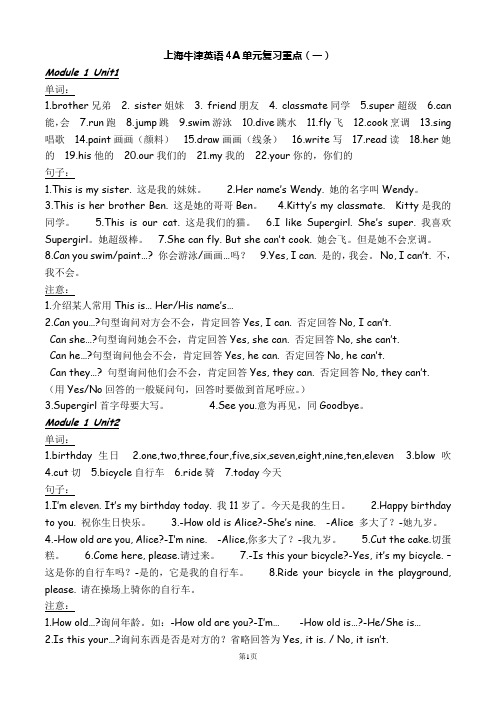
单词:1.brother兄弟2. sister姐妹3. friend朋友4. classmate同学5.super超级6.can 能,会7.run跑8.jump跳9.swim游泳10.dive跳水11.fly飞12.cook烹调13.sing 唱歌14.paint画画(颜料)15.draw画画(线条)16.write写17.read读18.her她的19.his他的20.our我们的21.my我的22.your你的,你们的句子:1.This is my sister. 这是我的妹妹。
2.Her name’s Wendy. 她的名字叫Wendy。
3.This is her brother Ben. 这是她的哥哥Ben。
4.Kitty’s my classmate. Kitty是我的同学。
5.This is our cat. 这是我们的猫。
6.I like Supergirl. She’s super. 我喜欢Supergirl。
她超级棒。
7.She can fly. But she can’t cook. 她会飞。
但是她不会烹调。
8.Can you swim/paint…? 你会游泳/画画…吗?9.Yes, I can. 是的,我会。
No, I can’t. 不,我不会。
注意:1.介绍某人常用This is… Her/His name’s…2.Can you…?句型询问对方会不会,肯定回答Yes, I can. 否定回答No, I can’t.Can she…?句型询问她会不会,肯定回答Yes, she can. 否定回答No, she can’t.Can he…?句型询问他会不会,肯定回答Yes, he can. 否定回答No, he can’t.Can they…? 句型询问他们会不会,肯定回答Yes, they can. 否定回答No, they can’t.(用Yes/No回答的一般疑问句,回答时要做到首尾呼应。
上海牛津英语4A期末复习词 汇和语法汇总1
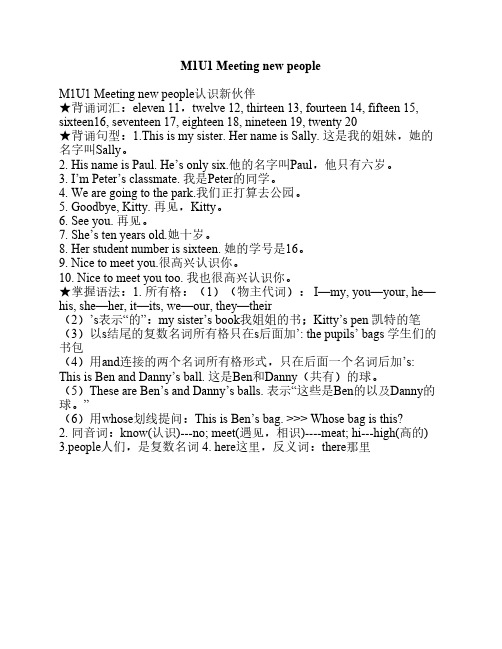
M1U1 Meeting new peopleM1U1 Meeting new people认识新伙伴★背诵词汇:eleven 11,twelve 12, thirteen 13, fourteen 14, fifteen 15, sixteen16, seventeen 17, eighteen 18, nineteen 19, twenty 20★背诵句型:1.This is my sister. Her name is Sally. 这是我的姐妹,她的名字叫Sally。
2. His name is Paul. He’s only six.他的名字叫Paul,他只有六岁。
3. I’m Peter’s classmate. 我是Peter的同学。
4. We are going to the park.我们正打算去公园。
5. Goodbye, Kitty. 再见,Kitty。
6. See you. 再见。
7. She’s ten years old.她十岁。
8. Her student number is sixteen. 她的学号是16。
9. Nice to meet you.很高兴认识你。
10. Nice to meet you too. 我也很高兴认识你。
★掌握语法:1. 所有格:(1)(物主代词): I—my, you—your, he—his, she—her, it—its, we—our, they—their(2)’s表示“的”:my sister’s book我姐姐的书;Kitty’s pen 凯特的笔(3)以s结尾的复数名词所有格只在s后面加’: the pupils’ bags 学生们的书包(4)用and连接的两个名词所有格形式,只在后面一个名词后加’s: This is Ben and Danny’s ball. 这是Ben和Danny(共有)的球。
(5)These are Ben’s and Danny’s balls. 表示“这些是Ben的以及Danny的球。
(完整版)上海牛津英语4a知识点汇总,推荐文档

上海牛津英语4a知识点汇总M1U1 Meeting new people1.词汇:classmate 同学schoolmate 校友deskmate 同桌friend朋友meet 遇见people人们eleven 十一twelve十二thirteen 十三fourteen 十四fifteen 十五sixteen 十六seventeen 十七eighteen 十八nineteen 十九twenty二十student number 学号sit 坐skip跳绳live居住near在……附近year年well好mask 面具2.词组:my classmate 我的同学go to the park 去公园ride a bicycle骑自行车skip arope 跳绳live near the school住在学校附近walk to school走路去学校playbasketball 打篮球like reading喜欢阅读years old 岁—Nice to meet you!很高兴遇到你!—Nice to meet you,too.我也很高兴遇到你!See you!再见!3.语法:形容词性物主代词his,her,your,my,its,their,our形容词性物主代词(所有格)后必须加名词。
my new classmate her dress our classroom his motherHis/Her name is……This is my sister.Her name’s Sally.(向别人介绍某个人)Can 句型can后的动词必须是原形He can swim very fast. He can’t sing.Can he climb a tree?主语是第一人称I、we,第二人称you和第三人称复数they、his parents等的时候,句中动词用原形;主语是第三人称单数时,动词要相应变化(加s)She lives near our school. She walks to school every day.My friend has a nice dress。
牛津小学英语-4A-M2-知识点整理(上海版)

4A M2U1 知识点整理一、单词grandfather grandmother father mother uncle---an uncle, aunt --- an aunt , cousin , parent , grandparents, man---men , police officer , dive---diving , really , right---write(同音词),great. sometimes , dish-dishes, photo----photos (a photo of) family—families, let’s-----let us,二、词组Photos of Jill’s family , welcome to my home , come and look at my new photos, on Mid-autumn Day , with her parents , visit her grandparents, come in -------go out , have some mooncakes , watch the beautiful moon , in the garden, come and help me , have a riddle for you , big and bright, in the short black dress, in the long red skirt , in the bright green skirt , catch the fish , wash the fish , put the fish on the dish三、基本句型you have brother and sisters Yes, I do.you have uncles and aunts Yes I do .)3. How many cousins do you have I have two .4. Does Bess have black dress Yes, she does .5. Does Peter have bright green shirt No, he doesn’t .6. How many shirts does that man have He has one .many dishes do your grandparents have There are eight.《4A M2U2 知识点整理一、单词job-----jobs, doctor, nurse---nurses, teacher , student ,police officer, firefighter, cook ,bus driver, brave---afraid, dangerous-------safe, dress----dresses, princess----princesses二、词组Look at the fire , call the fire station , bring the fire engine, put out the fire , welcome to our fire station, help people , play with the fire, visit a fire station , have a dream , buy a pretty dress, doesn’t care about the prince,三、基本句型\1 What do you do = What are you = What’s your job2 What does your father do = What’s your father = What’s your father’s job ?3 What does your mother do = What’s your mother= What’s your mother’s job/4A M2U3 知识点整理一、…二、单词Clothes , coat , shirt , blouse- blouses, T-shirt , skirt sweater, jeans , shorts , jacket, pants, mouse---mice , strong---weak , tooth -------teeth , sharp--------blunt , afraid---brave , bite----bitingKids=children bread skate---skating三、词组a pair of new trousers in a net , help the lion , wear a long jacket , put some ice cream on the bread ,an ice cream , eat the ice cream with the bread三、基本句型`1 What (clothes) does Tom haveHe has a green T-shirt and a pair of blue shorts.2What (clothes) do Peter and Sally haveThey have an orange T-shirt.四、作文My friendI have a friend. His name is Peter. He is tall and thin . He is ten years old .He has a coat and a pair of pants . He can play basketball. He likes swimming very much. I like him very much.。
上海牛津英语四年级上4A知识点梳理和配套练习(附答案))

4AModule 1 Getting to know youUnit 1 Meeting new people一.知识疏理1)词汇eleven twelve thirteen fourteen fifteen sixteen classmate2)短语Peter’s classmate go to the park a photo of talk about him ride a bicyclea new classmate student number near our school walk to school every daylike reading play basketball well sit at the table a funny mask put on the mask 3)句型This is my…. His /Her name’s…He’s/She’s…(age)He/She can…二.语言导读1)知识背景本单元主要是围绕Meeting new people这个主题展开学习的,通过对朋友或同学的介绍及描述,学习巩固物主代词his/her以及情态动词can, 熟练运用This is… His/Her name is…He /she can…这些句型,鼓励学生学会介绍他人。
由于之前学生已学过介绍自己,这里的重点是学习巩固物主代词his/her以及情态动词can。
2)重难点句子解释a) 口语应答A: See you. B: See you./ Goodbye./ Bye.A: Nice to meet you. B: Nice to meet you too.b) 句子结构分析(1) He/She can…是一句can句型的肯定陈述句:主语+ can +动词原形(主语变但是can一直不变);can句型的否定陈述句:主语+ can’t+动词原形.(2)She likes reading.是一句第三人称单数like 句型。
牛津英语上海版4A知识点梳理
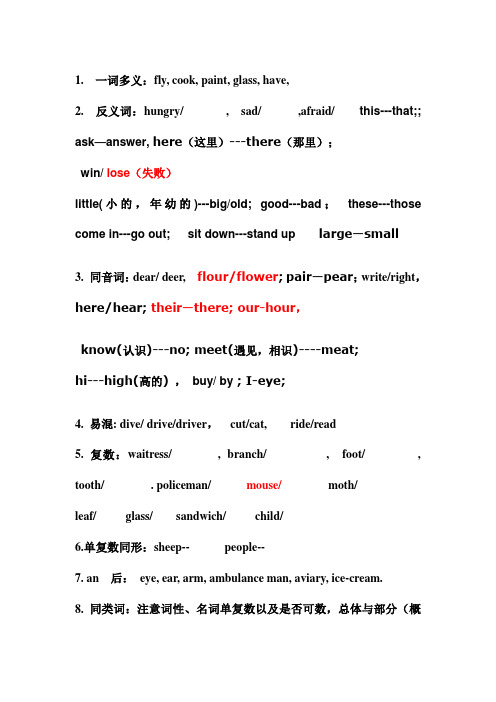
1. 一词多义:fly, cook, paint, glass, have,2. 反义词:hungry/ , sad/ ,afraid/ this---that;; ask—answer, here(这里)---there(那里);win/ lose(失败)little(小的,年幼的)---big/old; good---bad;these---those come in---go out; sit down---stand up large—small3. 同音词:dear/ deer, flour/flower; pair—pear;write/right,here/hear; their—there; our-hour,know(认识)---no; meet(遇见,相识)----meat;hi---high(高的) ,buy/ by ; I-eye;4. 易混: dive/ drive/driver,cut/cat, ride/read5. 复数:waitress/ , branch/ , foot/ , tooth/ . policeman/ mouse/ moth/leaf/ glass/ sandwich/ child/6.单复数同形:sheep-- people--7. an 后:eye, ear, arm, ambulance man, aviary, ice-cream.8. 同类词:注意词性、名词单复数以及是否可数,总体与部分(概括与举例)9. 动词第三人称单数形式:have/ , like/ , eat/ , do/ go/ .10. 物主代词:my, his, ...11. 宾格:me/ him/ her...You can call me...宾格:(1)I---me, you---you, he---him, she---her, it---it, we---us, they---them(2)宾格放在动词或介词的后面:Look at me. 看着我。
上海牛津英语4A-M4知识点总结

M4U1 A visit to a farm1.单词visit参观;拜访,hay干草,grass草,corn谷物,meat肉,litter乱扔(垃圾),walk走,pick摘;捡,throw扔,stone石头,don’t不要,rubbish垃圾(不可数),bin垃圾箱2.句型1).On his farm he has three sheep.在他的农场上有三只绵羊。
2). Don’t litter. 不要乱扔垃圾。
3). Don’t walk on the grass. 不要在草地上走。
4).Don’t pick flowers.不要摘花。
5). Don’t throw stones.不要扔石头。
6). Please put the rubbish in the rubbish bin.请把垃圾放在垃圾箱里。
7). Now let’s visit the farm.现在让我们参观农场。
8). What do they eat? 它们吃什么?9). They eat hay.它们吃干草。
10). He feeds the pig with the corn.他用谷物喂养猪。
11). The pig lives in a pen.猪住在围栏里。
12). It is angry.它生气了。
3.语法:1).单复数:sheep---sheep(单复同形);horse----horses;child---childrenthis---these;that---those2).hay, grass, corn, meat, rubbish(垃圾),都是不可数名词。
3). feed the animals喂养动物;grow the plants种植植物4). Don’t litter. (换一种说法) >>> You can’t litter.Don’t walk on the grass. (换一种说法) >>> You can’t walk on the grass.5). let’s = let us让我们,后面跟动词原形:Let’s go. Let’s play. Let’s sing and dance.6). take a visit to + 地点,一次去…的参观Let’s visit the farm. = Let’s take a visit to the farm.M4U2 At Century Park1.单词sketchbook素描本,cap帽子, camera-cameras相机, an aviary -aviaries 鸟舍, fountain喷泉, photo-photos照片, pond池塘, lovely =cute可爱的,far way远的road道路,take乘坐、拍照2. 词组:at Century Park在世纪公园in the picnic basket在野餐篮里,let me see我看一下, some peanut butter一些花生酱, have a picnic 去野餐, take the school bus= go there by bus 乘坐校车, be ready for为...做好准备far away from 很远-near 附近, look at the map of the park看公园的地图, beautiful flowers and plants美丽的花和植物, the plant house植物园,some aviaries一些鸟舍, next to紧靠…==beside 在...旁边= near在...附近home for birds小鸟的家, go and have a look去看一看,of course =sure当然, take some photos拍照片show them(展示)给他们看, beside the fountain喷泉旁边, play on the swing荡秋千,watch the fish and ducks观赏鱼和鸭子, under the tree在树下面,play in the garden在公园玩swing very high (秋千)荡的非常高,slide very fast滑的非常快3. 句型1.Where is Century Park? 世纪公园在哪里?It’s far away from our school.它离我们学校很远。
完整)上海牛津版四年级英语4A复习整理

完整)上海牛津版四年级英语4A复习整理Unit 1 (Module 1) Meet New PeopleIn this unit。
we will learn some new words and basic XXX.Words: XXX。
XXX。
XXX。
fourteen。
fifteen。
sixteen。
XXX。
XXX。
XXX。
twenty。
classmate。
know。
meet。
people。
schoolmate。
number。
school number。
near。
walk to school。
go to school on foot。
every day。
like reading。
play basketball。
play football。
a new student.Basic XXX Structures:This is。
(n)See you。
(goodbye)Nice to see you。
(greeting)Nice to see you too。
(response to greeting)Grammar:1.Adjective Possessive Pronouns: my。
her。
his。
yourIn English。
possessive pronouns XXX adjectives and come before the noun they modify。
They must be followed by a noun.For example: This is my brother。
His name is Tom.Adjective possessive pronouns change based on person and number:Singular: my。
your。
his/her/itsPlural: our。
your。
their2.Modal Verb "Can"Can" must be followed by a verb in its base form。
- 1、下载文档前请自行甄别文档内容的完整性,平台不提供额外的编辑、内容补充、找答案等附加服务。
- 2、"仅部分预览"的文档,不可在线预览部分如存在完整性等问题,可反馈申请退款(可完整预览的文档不适用该条件!)。
- 3、如文档侵犯您的权益,请联系客服反馈,我们会尽快为您处理(人工客服工作时间:9:00-18:30)。
1. 一词多义:fly, cook, paint, glass, have,
2. 反义词:hungry/ , sad/ ,afraid/ this---that;; ask—answer, here(这里)---there(那里);
win/ lose(失败)
little(小的,年幼的)---big/old; good---bad;these---those come in---go out; sit down---stand up large—small
3. 同音词:dear/ deer, flour/flower; pair—pear;write/right,here/hear; their—there; our-hour,
know(认识)---no; meet(遇见,相识)----meat;
hi---high(高的) ,buy/ by ; I-eye;
4. 易混: dive/ drive/driver,cut/cat, ride/read
5. 复数:waitress/ , branch/ , foot/ , tooth/ . policeman/ mouse/ moth/
leaf/ glass/ sandwich/ child/
6.单复数同形:sheep-- people--
7. an 后:eye, ear, arm, ambulance man, aviary, ice-cream.
8. 同类词:注意词性、名词单复数以及是否可数,总体与部分(概
括与举例)
9. 动词第三人称单数形式:have/ , like/ , eat/ , do/ go/ .
10. 物主代词:my, his, ...
11. 宾格:me/ him/ her...
You can call me...
宾格:(1)I---me, you---you, he---him, she---her, it---it, we---us, they---them
(2)宾格放在动词或介词的后面:
Look at me. 看着我。
I like them. 我喜欢他们。
You can call him Ben. 你能叫他Ben。
12. 否定:can/ do/ is/ are/ does/ have/ has/
12. this is:这个,近处的;that is 那个,远处的
13. How are you?/ How old are you?
What can you do?/ What do you do?
14. look at 看put out扑灭,play with玩…/和…一起玩,be
afraid of害怕…
16. 所有格:(1)(物主代词):I—my, you—your, he—his, she—her, it—its, we—our, they—their
(2)’s表示“的”:my sister’s book我姐姐的书;Kitty’s pen 凯特的笔
(3)以s结尾的复数名词所有格只在s后面加’: the pupils’ bags 学生们的书包
(4)用and连接的两个名词所有格形式,只在后面一个名词后加’s: This is Ben and Danny’s ball. 这是Ben和Danny(共有)的球。
(5)These are Ben’s and Danny’s balls. 表示“这些是Ben 的以及Danny的球。
”
(6)两个人名做主语时,看作复数,动词用动词原形形式。
Ben and Danny have got two ropes.
Ben and Danny like bananas.
Ben and Danny
(7)用whose划线提问:This is Ben’s bag. >>> Whose
bag is this?
并非所有的’s 都表示所有格,还有是is 的缩写,也有时是has的缩写。
17. 提问工作:What do you do ?= What are you?
What does he do? = What is he?
What does your father do ? = What is your father?
What do your sisters do?= What are your sisters?
18. 现在进行时:be动词+doing,表示“正在做….”,常与now, look, listen等词连用:
如:Super girl is coming. 超级女生来了。
He is drawing now. 现在他正在画画。
Look!The dogs are running. 看!小狗们正在跑。
Is Alice swimming now? Yes, she is. Alice 正在游泳吗?是的。
